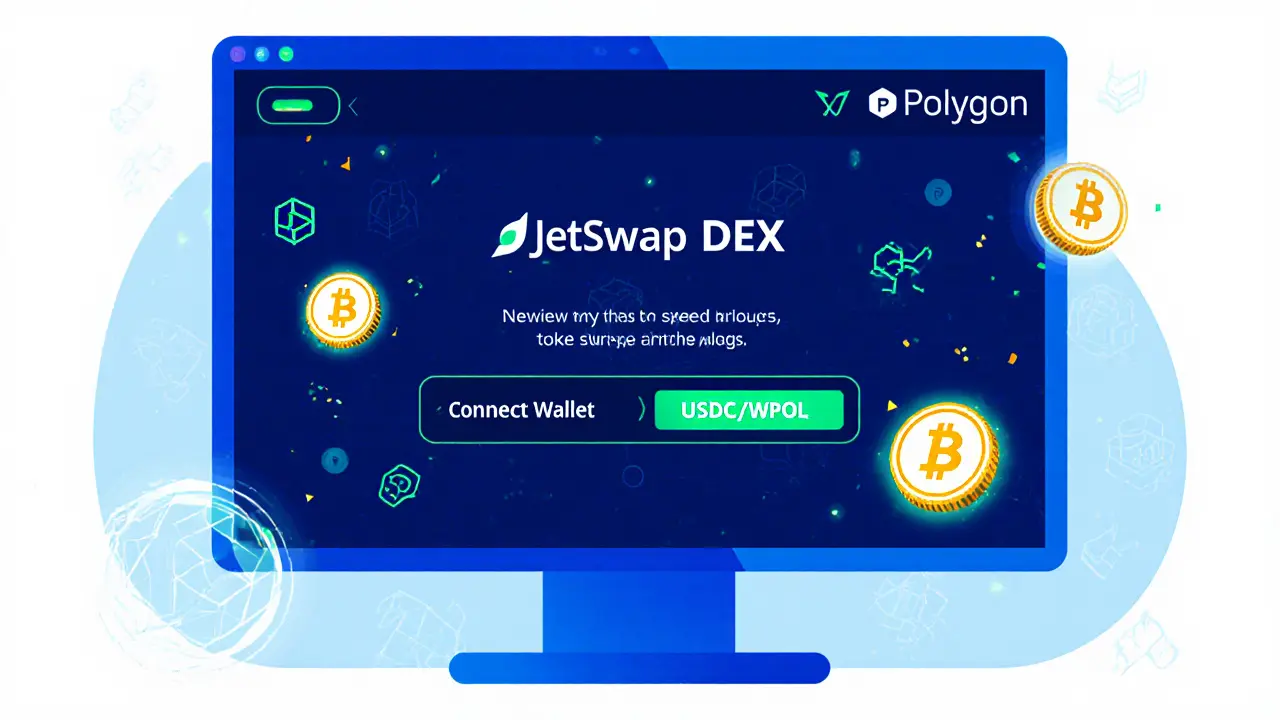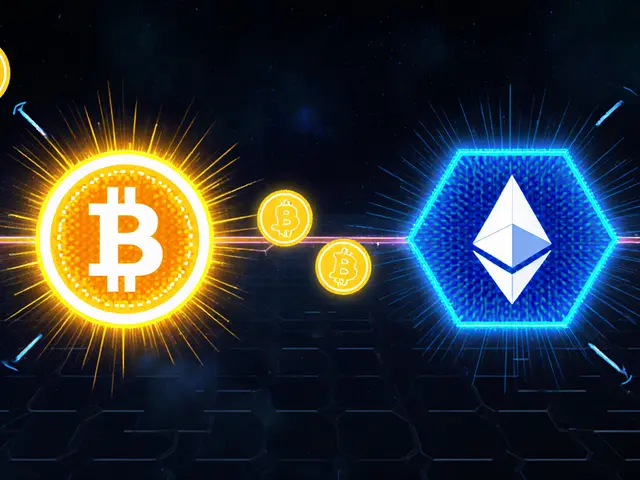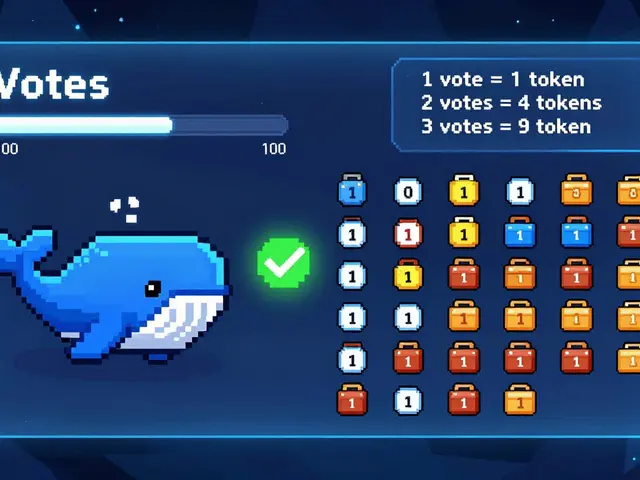JetSwap Polygon DEX Comparison Calculator
JetSwap
0.30% fee
Native pWINGS rewards
QuickSwap
0.30% fee
QUICK token incentives
SushiSwap
0.25% + 0.05% fee
SUSHI token rewards
Uniswap V3
0.05%-0.30% fee
No native rewards
Based on your simulation, JetSwap offers a balanced mix of low fees and attractive pWINGS rewards. QuickSwap has higher liquidity but fewer incentives. SushiSwap charges slightly less in fees but offers moderate rewards. Uniswap V3 gives the most flexibility in liquidity management but no direct token rewards.
When you hear the term JetSwap review, you’re probably wondering whether this Polygon‑based DEX lives up to the hype or just adds another option to an already crowded market. Below we break down what JetSwap actually does, how safe it feels, how you can start using it, and how it compares with the heavy‑hitters on Polygon.
JetSwap is a decentralized automated market maker (AMM) that launched in 2021 and operates on multiple blockchains, including Binance Smart Chain, Fantom, and Polygon. The platform is part of the broader JetFuel Finance ecosystem and uses the native reward token pWINGS for its Polygon‑based incentives.
What Sets JetSwap Apart on Polygon?
JetSwap leans into Polygon’s low‑fee, fast‑finality environment. Trades settle in seconds and cost a fraction of a cent, which is ideal for smaller swaps or frequent activity. The UI mirrors familiar DEX designs: you connect a Web3 wallet, pick a pair, and hit swap. But beyond the basic AMM, JetSwap adds three layers of utility:
- Yield farming: Deposit JetSwap LP tokens into WINGS farms and earn per‑block rewards paid in pWINGS.
- Single‑asset staking: Stake pWINGS, PFORCE, or pSWAMP in “Pilots Pools” or auto‑compounding vaults.
- Gamified incentives: A lottery that uses WINGS tokens and an IJO (Initial Jetfuel Offering) launchpad for early‑stage projects.
All of this runs on smart contracts that stay on‑chain, meaning you never hand over custody to a centralized entity.
Getting Started: A Step‑by‑Step Walkthrough
- Install a compatible wallet such as MetaMask and add the Polygon network (RPC URL: https://polygon-rpc.com, Chain ID: 137).
- Fund your wallet with POL (formerly MATIC) to cover transaction fees.
- Navigate to jetswap.finance, click “Connect Wallet,” and approve the connection.
- Choose a trading pair (e.g., USDC/WPOL) and enter the amount you wish to swap. Confirm the transaction in MetaMask - the gas fee should be well under $0.01.
- If you want to earn, head to the “Farms” tab, locate a WINGS farm, and deposit the corresponding LP token. Click “Harvest” whenever you’re ready to claim pWINGS.
- For single‑asset staking, go to the “Staking” section, select pWINGS (or PFORCE/pSWAMP), and stake the amount you desire. Rewards accumulate automatically and can be withdrawn at any time.
The process is intentionally frictionless: no KYC, no account creation, and you retain full control of your private keys.
Security Considerations
Because JetSwap is fully decentralized, the primary security focus is on its smart contracts. The contracts on Polygon (e.g., 0x0487b824c8261462f88940f97053e65bdb498446) handle swapping, liquidity provisioning, and reward distribution. However, the platform does not prominently display comprehensive audit reports. That absence doesn’t automatically mean the code is unsafe, but it does raise a red flag for risk‑averse users.
To mitigate risk, consider these best practices:
- Start with a small amount of capital to test the swap and staking flows.
- Verify contract addresses on official JetSwap social channels (Twitter @Jetfuelfinance, Medium blog).
- Use a hardware wallet for larger positions, as it isolates private keys from potential browser exploits.
- Keep an eye on community forums for any reports of bugs or exploits.
Overall, JetSwap’s security posture is comparable to other Polygon AMMs that lack formal audits but benefit from community scrutiny.
How JetSwap Stacks Up Against the Competition
Polygon hosts several well‑established DEXs. Below is a snapshot comparison focusing on fee structure, incentives, and unique features.
| DEX | Launch Year | Base Fee | Native Incentive Token | Special Features |
|---|---|---|---|---|
| JetSwap | 2021 | 0.30% | pWINGS | Multi‑chain, lottery, IJO launchpad, auto‑compounding vaults |
| QuickSwap | 2020 | 0.30% | QUICK | High‑volume liquidity, easy token listings |
| SushiSwap | 2020 (Polygon) | 0.25% (swap) + 0.05% (protocol) | SUSHI | Kashi lending, BentoBox vaults, broad ecosystem |
| UniswapV3 | 2021 (Polygon) | 0.05%‑0.30% (concentrated liquidity) | None (fee‑only) | Concentrated liquidity, flexible fee tiers |
Key takeaways:
- JetSwap’s fee is on par with QuickSwap, but it offers a richer reward layer via pWINGS.
- UniswapV3 provides the most granular liquidity control, yet it lacks a native token incentive for regular traders.
- SushiSwap’s “Kashi” lending adds borrowing options that JetSwap does not currently support.
If you prioritize earning extra tokens while you trade, JetSwap’s farming and lottery give it an edge. If you need advanced liquidity positioning, UniswapV3 may be a better fit.
Tokenomics: Understanding pWINGS and WINGS
The reward system revolves around two tokens:
- WINGS: The original utility token for the JetFuel Finance ecosystem. It’s used for governance and lottery participation.
- pWINGS: The Polygon‑specific “wrapped” version that powers all incentives on the Polygon side of JetSwap. pWINGS can be staked directly or earned via LP farming.
Both tokens follow a per‑block emission schedule, meaning rewards accrue continuously. As of October2025, the annualized yield on popular LP pairs (e.g., USDC/WPOL) ranges from 12% to 18% APY, depending on pool depth and overall platform activity. The auto‑compounding vaults simplify the process: you deposit pWINGS, and the contract reinvests harvested rewards automatically.
Because pWINGS lives on Polygon, its transaction costs stay negligible, making frequent compounding financially viable.
Future Outlook and Roadmap
Polygon is rolling out “Polygon2.0,” a suite of ZK‑rollup upgrades promising even lower latency and near‑zero fees. JetSwap’s multi‑chain design positions it to adopt these upgrades without a full migration, potentially giving it a performance advantage over single‑chain rivals.
Upcoming JetSwap milestones (as hinted on their Medium blog) include:
- Integration of a cross‑chain bridge to move liquidity between BNB Chain, Fantom, and Polygon with a single click.
- Launch of a governance portal where pWINGS holders can vote on fee adjustments and new farm allocations.
- Expansion of the IJO launchpad to include a vetting DAO, adding community‑driven project selection.
If these plans materialize, JetSwap could solidify its niche as a multi‑chain DeFi hub rather than just another Polygon DEX.
Pros, Cons, and Bottom Line
Pros
- Low Polygon fees and fast swaps.
- Multiple earning pathways: farms, staking, lottery, launchpad.
- Multi‑chain footprint offers flexibility.
- Simple UI familiar to any Ethereum‑based DEX user.
Cons
- Lack of publicly visible, third‑party audit reports.
- Liquidity on some niche pairs can be thin, leading to higher slippage.
- Reward yields depend heavily on platform activity; they can swing dramatically.
Bottom line: If you’re already on Polygon and want to earn extra tokens while you trade, JetSwap offers a compelling package. Just start small, verify contracts, and keep an eye on the evolving security landscape.
Frequently Asked Questions
Is JetSwap safe to use on Polygon?
JetSwap’s contracts are open‑source and have been inspected by community members, but the platform does not publish formal audit reports. For typical retail amounts, the risk is comparable to other unaudited Polygon DEXs. Using a hardware wallet and testing with a small sum are prudent steps.
How do I claim my pWINGS rewards?
Navigate to the “Farms” or “Staking” tab, click the “Harvest” button next to your position, and confirm the transaction in your wallet. The rewards are transferred instantly on‑chain.
Can I use JetSwap without a hardware wallet?
Yes. Any Web3‑compatible wallet (MetaMask, Trust Wallet, Coinbase Wallet) works. However, hardware wallets add an extra layer of protection against phishing or malware.
What’s the difference between WINGS and pWINGS?
WINGS is the original token used across JetFuel Finance’s multi‑chain ecosystem. pWINGS is the Polygon‑specific wrapper that powers rewards, staking, and liquidity farming on JetSwap’s Polygon side.
How does JetSwap compare to QuickSwap?
Both charge a 0.30% fee, but JetSwap adds native pWINGS rewards, a lottery, and an IJO launchpad. QuickSwap offers higher overall liquidity and a larger user base but fewer built‑in token incentives.







Philip Smart
October 11, 2025 AT 08:36JetSwap’s fees look decent, but the rewards feel like a gimmick.
Jacob Moore
October 12, 2025 AT 04:03Hey folks! If you’re looking to dip your toes into Polygon DEXes, JetSwap actually offers a pretty smooth UI. The 0.30% fee is on par with QuickSwap, but the pWINGS rewards can boost your APY if you stake them properly. I’d suggest starting with a tiny swap, just to see how the gas feels on your wallet. Once you’re comfortable, check out the farms – the auto‑compounding vaults are a nice hands‑off way to earn. Remember, always keep a little extra POL for gas, especially when the network spikes.
gayle Smith
October 12, 2025 AT 23:29While the UI is user‑friendly, the underlying protocol leverages a multi‑layered incentive architecture that intertwines pWINGS tokenomics with dynamic liquidity provisioning. The synergy between yield farming and the lottery mechanism creates a value‑capture loop, albeit one that may be perceived as overly complex for neophytes.
mark noopa
October 13, 2025 AT 18:56Let’s unpack the philosophical underpinnings of JetSwap’s design, because it’s more than just another AMM on Polygon. First, the platform embraces the principle of composability, allowing LP tokens to be nested within staking vaults, which in turn feed back into the liquidity pool – a recursive loop that mirrors fractal geometry. 🌌 Second, the reward distribution model is not merely a financial incentive; it acts as a gamified social contract that nudges participants toward collective liquidity provision, effectively aligning individual utility maximization with network health. Third, the choice of a 0.30% flat fee reflects a deliberate trade‑off between revenue capture and market competitiveness, acknowledging that on a high‑throughput L2 like Polygon, users gravitate toward fee transparency.
Now, onto the tokenomics: pWINGS serves as a wrapped derivative of WINGS, enabling seamless cross‑chain interoperability while preserving the governance token’s scarcity dynamics. This dual‑token structure introduces a bifurcation of value – one side for utility within the DEX, the other for broader ecosystem governance, reminiscent of the dual‑token paradigm popularized by Cosmos.
The auto‑compounding vaults are a brilliant illustration of what I call “mechanical altruism”: smart contracts autonomously reinvest harvested rewards, thereby reducing the opportunity cost of manual claiming. This not only optimizes APY but also mitigates gas overhead, a crucial consideration even on low‑cost networks.
Furthermore, the inclusion of a lottery and IJO (Initial Jetfuel Offering) launchpad adds layers of speculative participation, catering to risk‑tolerant users who seek exponential upside. However, these features also introduce variance in expected returns, which can be modeled using stochastic processes akin to Monte Carlo simulations.
Security-wise, the absence of a formal third‑party audit is a notable blind spot. While community audits and open‑source transparency provide some assurance, the lack of an immutable audit seal leaves the platform vulnerable to undisclosed exploits. Users should therefore adopt a risk‑mitigated approach: start with minuscule capital, employ hardware wallets, and constantly monitor community channels for any red flags.
In summary, JetSwap is a fascinating case study in DeFi design, blending composability, gamified incentives, and cross‑chain ambition. Its success hinges on user adoption, sustained liquidity, and eventual audit validation. 🚀
Rama Julianto
October 14, 2025 AT 14:23Listen up – the contract addresses listed on the official site are the only ones you should trust. Anything else is a scam, period. Start with $10, watch the fees, and only then think about farming. If you get burned, that’s on you for not doing basic due diligence.
Helen Fitzgerald
October 15, 2025 AT 09:49Hey team, just wanted to add that JetSwap’s UI feels super intuitive for newbies. The “Connect Wallet” button is right where you expect it, and the token selection dropdown isn’t cluttered. If you’re on a mobile device, the layout scales nicely too.
Jon Asher
October 16, 2025 AT 05:16Totally agree, the app is clean and easy to use. I was able to swap USDC for WPOL in under a minute without any hiccups.
Jade Hibbert
October 17, 2025 AT 00:43Sure, because we all love another DEX that promises “high rewards” while basically doing the same thing as QuickSwap.
Leynda Jeane Erwin
October 17, 2025 AT 20:09While the enthusiasm is noted, it would be prudent to consider the liquidity depth of each pair before committing capital. Additionally, the platform’s documentation could benefit from a more structured presentation.
Leo McCloskey
October 18, 2025 AT 15:36JetSwap-another so‑called “innovative” AMM; however, the 0.30% fee is merely a cosmetic veneer over an otherwise unremarkable tokenomics schema. The lack of a reputable audit further undermines confidence, rendering the platform a speculative gamble at best.
arnab nath
October 19, 2025 AT 11:03Did you know the developers are secretly funded by a hidden DAO? It’s all a staged narrative.
Nathan Van Myall
October 20, 2025 AT 06:29I’m curious about the actual gas cost when performing multiple swaps in a row on Polygon. The UI shows near‑zero fees, but I want to confirm the on‑chain numbers.
debby martha
October 21, 2025 AT 01:56Gas is super cheap, lol. Just try it out and you’ll see.
ചഞ്ചൽ അനസൂയ
October 21, 2025 AT 21:23Bro, if you’re not staking pWINGS, you’re leaving money on the table. The auto‑compound vaults are literally a set‑and‑forget win‑win.
Orlando Lucas
October 22, 2025 AT 16:49From a systems‑thinking perspective, the interplay between the farm incentives and the lottery creates a feedback loop that can amplify user engagement. When users earn pWINGS, they’re incentivized to either restake or enter the lottery, both of which increase overall platform activity. This, in turn, drives higher transaction volume, which can improve the perceived health of the DEX. However, the sustainability of this loop depends on the token emission schedule; if rewards taper too quickly, the user base may churn. It’s crucial for JetSwap to monitor reward velocity and adjust parameters dynamically. In practice, the community governance token (WINGS) could serve as a lever to fine‑tune these dynamics, ensuring long‑term equilibrium.
Scott Hall
October 23, 2025 AT 12:16Just tried the swap feature and it felt snappy. No complaints so far.
Brandon Salemi
October 24, 2025 AT 07:43Honestly, the UI is clean-but the reward calculator feels a bit oversimplified.
Siddharth Murugesan
October 25, 2025 AT 03:09The whole platform is a smokescreen. They’re just funneling user funds into hidden vaults while promising “high yields”. Don’t be fooled.
Lena Vega
October 25, 2025 AT 22:36Thanks for the warning. I’ll keep an eye on it.
Mureil Stueber
October 26, 2025 AT 17:03JetSwap’s documentation could benefit from clearer examples, especially around the auto‑compounding process.
Emily Kondrk
October 27, 2025 AT 12:29Honestly, the tokenomics feel like a psychedelic carnival-there’s pWINGS glittering everywhere, but the underlying value is a murky soup of speculative hype. If you love riding that colorful rollercoaster, JetSwap is your ticket.
Laura Myers
October 28, 2025 AT 07:56While I appreciate the flamboyant flair, some of the phrasing borders on hyperbole. A concise, fact‑based summary would serve newcomers better.
Melanie Birt
October 29, 2025 AT 03:23Quick tip: after farming, don’t forget to harvest your pWINGS and stake them in the vault for auto‑compounding. It maximizes returns! 😊
Lady Celeste
October 29, 2025 AT 22:49Sounds like a gimmick to me.